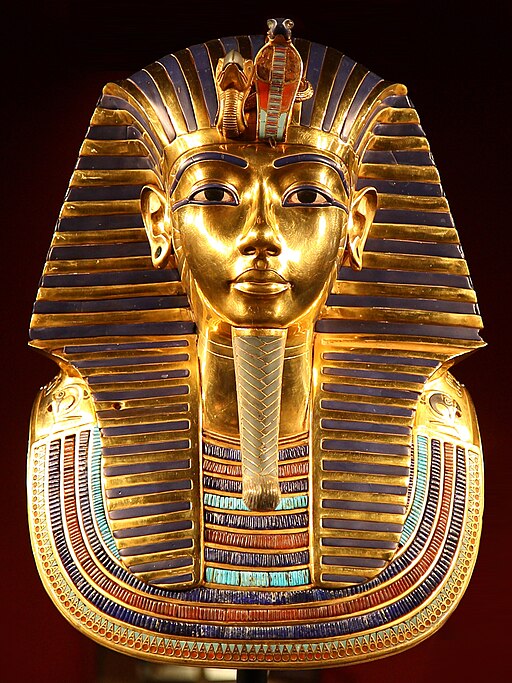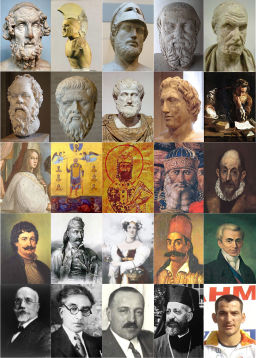
This statue of the Deified Empress Livia is an early imperial statue after a Greek model of the Goddess Hera from the 5th century BC.
She is depicted with divine attributes such as the cornucopia, which is a promise of fortune and prosperity through the activities of the Roman imperial family.
In classical antiquity, the cornucopia, also called the horn of plenty, was a symbol of abundance and nourishment, commonly a large horn-shaped container overflowing with produce, flowers or nuts.
Legend said that Octavius, the future Emperor Augustus, fell immediately in love with Livia, although he was still married.
Octavius divorced his second wife, on the day that she gave birth to his daughter and only child. Around the same time, when Livia was six months pregnant, Livia’s husband was persuaded or forced to divorce Livia.
Augustus and Livia married a few days after she gave birth. Livia and Augustus remained married for the next 51 years but had no children.
Livia enjoyed the status of privileged counselor to her husband, petitioning him on behalf of others and influencing his policies, an unusual role for a Roman wife at that time.
Augustus died at the age of 75, probably from natural causes. However, there were unconfirmed rumors that his wife Livia poisoned him so that her son, Tiberius, could succeed him as emperor.
The Roman Imperial Cult
The Imperial cult of ancient Rome identified emperors and some members of their families with the divine authority. Its framework was based on Roman and Greek precedents.
A deceased emperor held worthy of the honor could be voted a state divinity by the Senate and elevated as such in the act of apotheosis.
The granting of apotheosis served religious, political, and moral judgment on Imperial rulers and allowed living Emperors to associate themselves with a well-regarded lineage from which unpopular predecessors were excluded.
Livia
Livia Drusilla (58 BC – 29 AD), also known as Julia Augusta after her formal adoption into the Julian family in AD 14, was the wife of the Roman emperor Augustus throughout his reign, as well as his adviser.
She was the mother of the emperor Tiberius, the paternal grandmother of the emperor Claudius, a paternal great-grandmother of the emperor Caligula, and maternal great-great-grandmother of the emperor Nero.
She was deified by Claudius, who acknowledged her title of Augusta.
Livia Drusilla
- Born: 58 BC
- Died: 29 AD (aged 87)
- Spouses: Tiberius Claudius Nero, Augustus in 39 BC
- Children: Tiberius; Nero Claudius Drusus
- Reign: 27 BC – 14 AD
Augustus – Emperor of the Roman Empire
- Born: Gaius Octavius Thurinus
- Born: 63 BC – Rome, Roman Republic
- Died: 14 AD (aged 75)
- Spouses:
- Claudia Pulchra (42–40 BC; divorce)
- Scribonia (40–38 BC; divorce)
- Livia Drusilla (37 BC– 14 AD; his death)
- Children: Julia, the Elder
- Reign: 27 BC – 14 AD
- Successor: Tiberius
Cornucopia
Mythology offers multiple explanations of the origin of the cornucopia. One of the best-known involves the birth and nourishment of the infant Zeus, who had to be hidden from his devouring father, Kronus.
Hidden in a cave, baby Zeus was cared for and protected by some divine attendants, including the goat Amaltheia “Nourishing Goddess,” who fed him with her milk.
The future suckling king of the gods had unusual strength. While playing with his nursemaid, he accidentally broke off one of her horns, which then had the divine power to give eternal nourishment, as the foster mother had to the god.
The cornucopia became the attribute of several Greek and Roman deities.
It was particularly associated with the harvest, prosperity, or spiritual abundances, such as personifications of Earth such as the Greek Gaia or Roman Terra.
In the Roman Imperial cult, Roman deities who fostered peace and prosperity were also depicted with a cornucopia.
Statue of Deified Empress Livia
- Title: Statue of Deified Empress Livia
- Date: 42 – 54 AD
- Location: Theater of Faleriiat, Civita Castellana, Lazio, Italy
- Medium: Marble
- Type: Marble Statue
- Dimensions: 247 x 130 x 57 cm
- Acquired: 1841
- Museum: Altes Museum (German for Old Museum)
Livia’s Power in Ancient Rome
Highlights of the Altes Museum
- Torso of a Hoplite Warrior
- Amphora – Depiction of a Funerary Procession
- Statuette of a Horse in Geometric Style
- Statue of Deified Empress Livia
- Votive Relief dedicated to Vesta
- Head of Athena in the Velletri Type
- Funerary Lion
Empress Livia Drusilla
Explore Berlin’s Museums
- The Pergamon Museum
- Neues Museum
- Altes Museum
- Alte Nationalgalerie – National Gallery (Berlin)
- Bode Museum
- Gemäldegalerie, Berlin
- Spy Museum Berlin
- Jewish Museum, Berlin
- Deutsches Historisches Museum – German Historical Museum
- DDR Museum
Livia
Dinner with Empress Livia?
Augustus and Livia
~~~
“Love is just a word until you and that someone who comes along gives it meaning.”
– Livia
~~~
Photo Credit: JOM
Popular this Week








 Sponsor your Favorite Page
Sponsor your Favorite Page SEARCH Search for: Search Follow UsJoin – The JOM Membership Program
Sponsor a Masterpiece with YOUR NAME CHOICE for $5
Share this:
- Tweet
